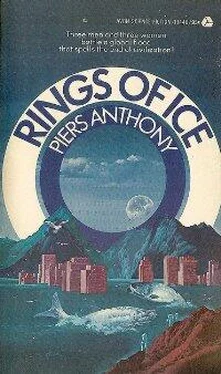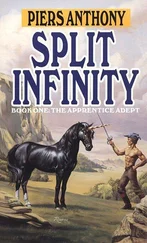Now they were six, plus the cat—and it was crowded. The motor-home was designed to accommodate six, but the manufacturer had obviously not intended them all to be confined to it for twenty-four hours a day without relief.
Two were always resting or asleep on the rear couches, and two were always in the seats up front. That left two—and Dust Devil—in limbo, awake and active with nothing to do. The cat seemed to feel that all comfortable furniture was reserved for him, and he was ready to battle for his rights. The flooded sections of the highway were almost a relief.
Zena washed some clothing in the bathroom and hung it over available edges for whatever drying it could manage. Her legs were tired from standing while the bus jolted. But Thatch was sleeping on the dinette-alcove bed. He could have used the one that came down from the ceiling above the rear bed, but Gus didn’t like anyone there when he was with Karen. That left Zena the sodden floor.
“I’m awake,” Thatch said. “Sit down.”
“Thanks.” She sank to the edge of the bunk, relieved to get the weight off her feet.
He swung his own feet to the floor. He was dressed, of course; night clothing was pointless in this circumstance. They had fallen into the habit of changing whenever it was necessary to go outside, so that each person had a dry set of clothing waiting inside. Zena had thus seen more of the others than she liked, and shown more of herself. Gus’s eyes did not help.
“Some dream!” Thatch said.
“Dream?” He seldom volunteered anything, and it had not occurred to her that he would have dreams. Now she was curious.
“That I was home with my family,” he said.
“There’s nothing wrong with that.”
“I don’t have a family. Never did. Only foster homes.”
“You were an orphan?”
“Not exactly. Illegitimate.”
She found herself both gratified and upset by this confidence. She was glad he now felt free to talk about himself, but appalled at the bleakness of his background. Still, it helped her to understand him. He had never had a normal family, no real roots. Thus, never a chance to develop the sense of security or interdependence of a family relationship.
Gus must have become that family. Dictatorial Gus, like an arrogant father, giving orders that were not to be gainsaid. Yet Gus was weak, too—like some fathers—and that side of him brought out Thatch’s loyalty. Thatch’s entire lost childhood, the good and the bad, given a twisted fulfillment through this odd subservience.
So she had a comprehension of the man, of sorts. Still, it twisted something in her gut. What was comprehensible was not necessarily acceptable.
Thatch misunderstood her silence. “I did have a father. I just never knew who he was, so I never missed him. And my mother—”
Zena sat up straight. “Mother!” she exclaimed.
Thatch looked perplexed. “Something wrong?”
“What have I been thinking of? My mother lives on the coast!”
“So does mine,” Gordon said from the driver’s seat. Zena had forgotten that he and Floy were within hearing. They had not been snooping; it was almost impossible to hold a private conversation here.
“This flooding—” Zena said.
Gordon slowed the vehicle, so that he could pay more attention to the conversation. That was one of the little ways he showed his priorities. People always came first. “Do you think the sea itself will rise? I assumed that there was only a limited amount of water available to circulate, so that it had to be rising into the atmosphere from the ocean as fast as it falls on land. When this disturbance passes—”
Zena sidestepped that. “The runoff will wash right through the coastal cities. Supplies will be cut. There’ll be looting. I want to get my mother out of there!”
“I see your point. Where is she?”
“Jacksonville. It’s almost on our route.”
“My folks are in Norfolk.”
“Maybe we couldn’t drive all the way in, but we could get close enough to hike the rest of the way,” she said eagerly. “Fetch her out—she’s a widow, my father died two years ago.”
“What nonsense is this?” Gus demanded, coming up from the back room.
“With all our driving problems,” Gordon said, “we never thought of other people. Our relatives—”
“We can’t go looking for relatives!” Gus exclaimed. “We’ve got six here now—a full crew!”
“My mother will die, alone in that city!” Zena cried.
“What city?”
“Jacksonville.”
“We’re past Jacksonville! Can’t turn back now.”
“What?” Zena asked. “We can’t be.”
“You think we’ve been standing still while you’ve been sleeping? The intersection for Jacksonville was at the Suwannee crossing, where we rowed the bus. We’re in Georgia now.”
“We can’t be that far along,” Zena said. “There are other roads—”
Karen came up. “She’s got a point, Gus. We have to make a side trip for food supplies, too.”
Why was food always on Karen’s mind, especially sweet food? If she really had that big a hunger, she should weigh two hundred pounds, Zena thought resentfully.
“If we go wandering into flooded cities, we’ll never make it to high ground!” Gus said. “We have to save ourselves; we can’t do any more than that—but we could do a hell of a lot less than that by diverting our energy and wasting time.”
“Do you call saving lives wasting time?” Zena cried, beginning to sound distressingly hysterical in her own ears.
“How many people live in Jacksonville?” Gus demanded. “A million? You want to save one old woman and let the rest wash out to sea?”
“That’s heartless!” Zena said, feeling tears in her eyes. She saw Karen nodding, and felt a surge of gratitude for that silent support. After the way she had spoken to Karen, and thought about her…
“No, it’s practical,” Gus said. “We can’t save the world; we can’t save even a fraction of it. If we load ourselves down with useless people, we won’t even save ourselves.”
“Useless people!” Zena cried. “You mean anyone who won’t haul on a pulley or serve as a sex object?”
“No!” Gus said, growing heated. Then he paused. “But looking at it your way, maybe the answer is yes.”
“My way!”
“Now we’re fighting among ourselves,” Gordon said. “Believe it or not, I can see both sides—and both have merit.”
“What both sides?” Zena demanded. Her body was shaking.
“His side: we have to get to high ground as rapidly as possible, so we can park without danger of getting flooded out, and can begin foraging for survival supplies. We can’t delay even a day, because that might get us trapped behind deep water and an impassable current. And all our members have to be young and healthy, or the group will be too weak to stand up.”
“Good summary,” Gus agreed. “This is the second deluge, you know—literally. According to the Annular Theory—”
“We aren’t all strong or healthy,” Zena began. But even in the heat of argument she couldn’t speak the obvious about Karen and Floy.
“Your side,” Gordon continued, turning to Zena. “Survival of this small group is no good if it is accomplished at the price of dehumanization. We can’t preserve our bit of civilization by ruthlessly writing off relatives and ignoring the plight of those most in need. And somewhere in Jacksonville there are bound to be supplies that we shall need for the long haul.”
“That’s it!” Zena exclaimed. “You think just like a woman.”
“Thank you,” Gordon said. “Hardly surprising, since I am a—”
“Don’t start that again, either!” Gus cried.
Читать дальше










